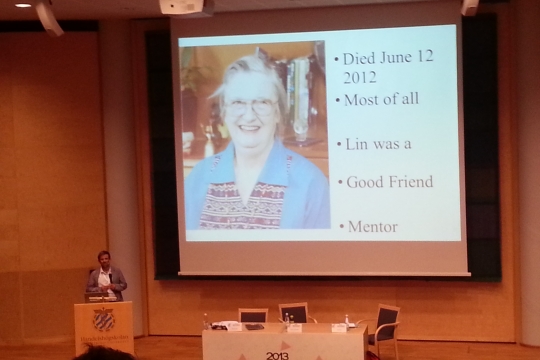In conjunction with Europe's largest national economy conference, EEA ESEM, the Environmental Economics Unit at the University of Gothenburg held a special session in memory of Elinor Ostrom on Thursday 29th of August, 2013. The session was sponsored by the Swedish Research Foundation, FORMAS.
Elinor Ostrom became the first and so far the only woman to win Sveriges Riksbank Prize in Economic Sciences in Memory of Alfred Nobel. She received the award in 2009 for her work on how individuals and communities manage common resources as good or better than markets, companies and governments. Ostrom's research is applicable to everything from irrigation and fishery to information systems. In 2012, she was featured in Time magazine's list of the world’s 100 most influential people.
“We cannot compete with her work but want to pay her tribute by showing the breadth of her important contribution to the management of natural resources and the environment,” said Thomas Sterner, Professor of Environmental Economics at the Department of Economics of University of Gothenburg and the initiator of the session. “Elinor was a good friend and a mentor” he added.
The session included three presentations presented by Scott Barrett from Columbia University, Eswaran Somanathan from India Statistical Institute, and Thomas Sterner from University of Gothenburg depicting Ostrom's interest in theory, practical field work, and experiments.
Scott Barrett about people's motivations and approaches
Scott Barrett talked about the paper “When Early Warning of Collapse Can Rescue the Commons from Tragedy” (co-authored with Astrid Dannenberg).
A conflict between individual and collective interests can lead to free riding, overexploitation, and even collapse if the resource is prone to “tipping.” The prospect of crossing a critical threshold, however, also offers an opportunity to reverse the incentive to free ride. Using an experiment, rooted in a game theoretic model, they show that behavior differs dramatically either side of a dividing line for threshold uncertainty. By reducing threshold uncertainty to the “good” side of the dividing line, the new science of early warning signals can trigger the behavioral regime shift needed to rescue the commons from tragedy.
Eswaran Somanathan on climate
E. Somanathan discussed the paper "The Evolution of Meaningful and Credible Climate Agreements" (co-authored with Shoibal Chakravarty). The talk examined the evolution of international cooperation in climate change with the help of game theory, where different countries are negotiating a future climate agreement. It was shown that an efficient subgame-perfect treaty exists in a continuous-time framework, but is in the core of the associated cooperative game with externalities only at certain times. The cooperative game with externalities is defined assuming that coalitions play joint best responses to each other. The conclusion from the research is that it is possible to build an agreement but it is very difficult.
Thomas Sterner on Grandfathering
Thomas Sterner talked about the paper “Grandfathering” (co-authored with Maria Damon, Daniel Cole, and Elinor Ostrom). This article, which Ostrom worked on right up until the week before her death, analyzed the impact of grandfathering as a method for allocation of natural resources.
The principle of grandfathering is how historical use gives a claim or a right for future use. A current example is the allocation of rights to carbon, where a country that historically has placed a small percentage remained limited to that proportion, where a country with high emissions may continue to place relatively much. If grandfathering is applied as a distribution method, it means that countries benefit by always placing more than necessary to ensure the future rights.
This principle can be a useful mechanism when gathering for instance the stakeholders in an irrigation system, fishery or other common pool resource in order to bring them to the table and start the process of discovering and analyzing the use patterns in order to understand the resource and agree on future management. If however grandfathering is always used – and expected – as a principle, then this considerably dampens the incentives for proactive behavior and can even act as a perverse incentive to overuse a resource in order to secure “a good baseline” in future user agreements.
All three presentations illustrated various aspects of Elinor Ostrom's tireless work and showed that people can manage common environmental resources, but it is a difficult and demanding challenge to develop effective mechanisms for such care.
The session was sponsored by the Swedish Research Foundation, FORMAS
Time and place: Thursday, August 29, 2013, 1:00 p.m. to 2:15 p.m., Malmstenssalen, Vasagatan 1, School of Economics, University of Gothenburg.
Moderator: Thomas Sterner, University of Gothenburg, Scott Barrett, Columbia University and Eswaran Somanathan, Indian Statistical Institute
For more information, please contact Professor of Environmental Economics at the Department of Economics: Thomas Sterner: Thomas.sterner@economics.gu.se; Telephone: +46 (0) 708-16 33 06
